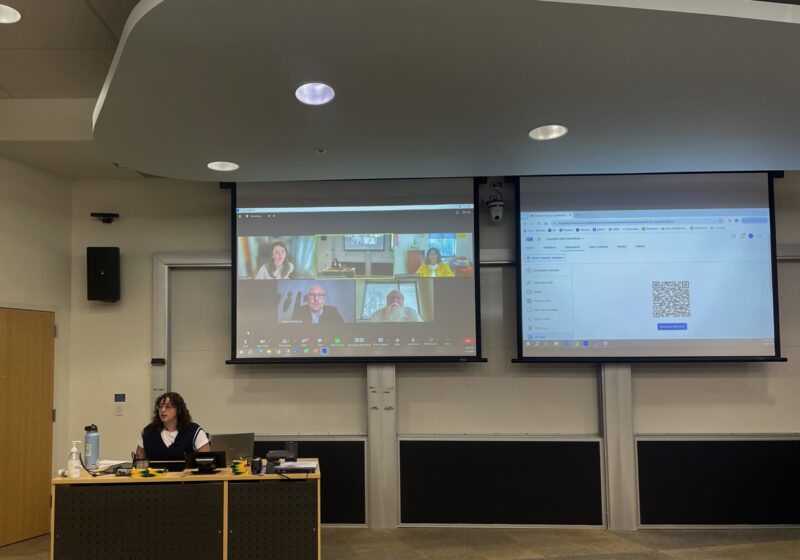In college, many people re-evaluate their religious beliefs or drop them altogether. Some people, however, find renewed faith as their religion helps them with their daily lives ? even becoming more religious than they were before college.
For those who are curious about other religions ? or about how to become more involved in their own ? here is a sampling of what’s available.
On campus, the Interfaith Chapel promotes and helps support the various religious communities at UR. They sponsor the Religious Roundtable, which meets on Sundays at 7:30 p.m. in the conference room on the office level of the Chapel. One of their upcoming events is a mixer dinner to be held on Saturday Nov. 16 at 6:30 p.m. for $3. They are also available to to help students find more information about religions or put you in contact with people who can answer your questions.
Islam
Islam, founded around the year 610 by the prophet Muhammed who received the Qur’an, is an evolution of the Judeo-Christian religions. The two major sects are the Shiites and Su’uni. All Muslims are directed to pray facing Mecca five times a day and are prohibited from drinking alcohol.
As far as tolerance is concerned, junior Faraz Khan says that he has “mostly come across students who are accepting of my faith. The hardest concept I have found for people to understand would be about why we, as Muslims, cannot drink alcohol at all. However, this campus is very supportive of all the differing beliefs.”
Khan added that he would like to stress that Islam is a religion based on peace.
There are weekly meetings of the Muslim Students Association on Tuesdays at 9:00 p.m. in Wilson Commons Room 121. For more about Islam, contact the Muslim Chaplain, Ismael Kareem at Izzykareem@hotmail.com.
Catholicism
The Catholic community at UR is a large and vibrant one with services on Sundays at 10:30 a.m. and 7:00 p.m. as well as Insta-Mass on Wednesdays at 10:00 p.m. in the Friel Lounge. On Tuesdays they celebrate Mass, followed by a pasta dinner and educational discussion.
Catholicism grew out of the travels of Jesus of Nazareth’s disciples and their spreading of his teachings. The religion was founded in Rome by Peter, the first Pope.
Catholics celebrate Communion ? a ceremony where bread and wine are consumed in remembrance of Jesus’s last meal before he was crucified. They believe that the bread and wine transubstantiate to the flesh and blood of Christ.
Father Brian Cool, the priest for the Newman Community at UR, suggests people come see their offerings, in part because he thinks “they will find it a different experience than at home” due to the different nature of their parish.
To find out more about Catholicism or to get involved, contact Father Cool at frbc@mail.rochester.edu.
Hinduism
One of the oldest world religions, Hinduism is rooted in an amalgam of beliefs. One of the more common misconceptions about Hinduism is that it is polytheistic. In actuality it is hinotheistic ? they believe in one god, but with many faces.
Some of its more basic beliefs are reincarnation and that there is no hell, simply being reborn as something less pleasant. Unlike many religions, it has no strong central organization.
On campus they are represented by Om, the Hindu Students Association. Om is involved in getting students to temple for holidays and at selected other times as well as providing a social network and educational activities about Hinduism.
For more information about Hinduism, contact Manoj Menon at mm003j@mail.rochester.edu.
Agnostic
Agnostics do not necessarily believe in a god, but they do not completely deny the possibility. Senior Nicole Ketterer described her reason for being agnostic as “there could be a god, but I haven’t seen any good proof for it though. So I’m not going to believe it.”
Atheists do not believe in a god at all, and have a variety of reasons for this ? from experiences to skepticism.
Buddhism
There are three major sects of Buddhism, the Mahayana, Theraveda and Lamaism. The basic tenets are encoded in the Four Basic Truths ? nothing lasts forever, suffering is caused by craving, eliminate craving and you’ll be happy and that following the Eightfold Path will eliminate craving. The Eightfold Path is the basic foundation of Buddhist behavior ? Right View, Intention, Speech, Action, Livelihood, Effort, Mindfulness and Concentration. Nirvana is reached by building karma and eventually ending the cycle of reincarnation.
For more information about Buddhism, call Sevan Ross at the Rochester Zen Center at 473-9180.
Protestantism
The Protestant community is a diverse one, with representatives from many branches of the Protestant faith all worshipping together. There are two Protestant services on Sundays in the Interfaith Chapel ? one at 5 p.m. and a Pentecostal service with gospel music at 3 p.m.
“We serve people from a really wide background of Protestant religions and people from no religious background at all,” Greg Osterberg, the University Protestant Chaplain, said. “I station myself at the Pit every day during the week,” in case students want to talk to a chaplain, he added.
Protestants diverged from the Catholic Church over a multitude of issues when Martin Luther nailed his 95 Theses against Catholicism to the door of a church in Wittenberg, Germany.
Protestants are Christians who do not believe that people must go through the clergy to speak to or with God. They do not generally celebrate Communion on a weekly basis, as Catholics do. They also tend to not believe in transubstantiation.
For more information about the various protestant sects contact Greg Osterberg at obrg@mail.rochester.edu.
Sikh
Founded in India 500 years ago by Guru Nanak, Sikhism has a strong element of social justice. Nanak was discontent with the different treatments of people of the different castes and genders. Characterized by their beards and turbans, all Sikh men share the same middle name and all Sikh women share the same middle name as well.
Junior Sona Rai believes that previous to September 11 Sikhs had been somewhat insular and that in response they’re been making a greater effort to educate people about their religion.
To learn more about Sikhs contact Rai at sr004k@mail.rochester.edu.
Judaism
The basic building block of Christianity and Islam, there are various sects of Judaism with their own particular dogmatic beliefs. The major sects are Orthodox, Reform, Conservative and Reconstructionist. The religion is monotheistic ? it’s one of the oldest religions in the world to believe in a single God ? and follows the 10 Commandments.
The Jewish community on campus is supported by Hillel, the Jewish student organization. Services take place on Friday nights at sundown in the Interfaith Chapel. Hillel also sponsors a number of activities, including community service.
“The Jewish community on campus is a very active one,” Aviva Zuckerman, Director of Development for Hillel, said. “We probably have about 80 percent of Jewish students connected to us in some way.” There is also a free Shabbat dinner after services every week in the chapel.
For more information on Judaism on campus, check out www.rochesterhillel.org.
Church of Jesus Christ of Latter-Day Saints
Commonly referred to as Mormons, members of the Church of Jesus Christ of Latter-Day Saints believe in a tradition of continual revelation from a living prophet that stems from the Old Testament of the Bible and is reinforced in the Book of Mormon.
The L.D.S. Church was founded in Palmyra, New York by Joseph Smith i
n 1820. After receiving gold plates that contained the Book of Mormon, Smith proceeded to translate them, thus founding the L.D.S. Church. The Book of Mormon is a record of peoples on the American continents in ancient times, and their relationship with God. Moroni ? a prophet from the Book of Mormon ? was the last person to have these plates and appeared as an angel to give them to Smith. The Mormons are Christians who have continued to receive phrophecies and instructions from God, whereas most Christian sects treat their religious revelations as essentially ending with the New Testament.
One common facet of the L.D.S. Church’s teachings are members going on two-year mission trips.
Contrary to popular misconception the L.D.S. Church no longer sanctions polygamy and hasn’t for 112 years. As far as dealing with misconceptions, Sophomore Kenta Takagi said, “I think, with the presence of the Interfaith Chapel, it’s a pretty diverse campus ? religious wise ? and I don’t feel any persecution.” Part of the L.D.S. Church teachings include allowing people to believe what they want and he enjoys the exchange of divergent views.
For more information about the Church of Jesus Christ of Latter-Day Saints contact Takagi at kt001i@mail.rochester.edu or visit www.mormon.org and www.lds.org.
Baha’i
Considered by some to have been a branch of Islam, it is recognized as a completely separate religion in modern times. The Baha’i believe the fulfillment of the Iranian prophet Bab’s prophecy for a great prophet or messianic figure was Baha’ull’a, whereas the original Babi do agree and still exist as a small modern sect.
The Baha’i believe that all religions grow out of each other and are rooted in different social teachings. Junior Zia Nizin said a common reaction from people when they hear she is Baha’i is “what’s that? I’ve never heard of it” and as such does not often encounter misconceptions.
She also feels most people are interested in her faith. In fact, one of her friends converted to Baha’i this past summer.
For more information about the Baha’i faith contact Nizin at ziatar@hotmail.com or visit www.bahai.org.
Additional reporting by Kelly Smith, Karen Taylor and Robin Tanner.





